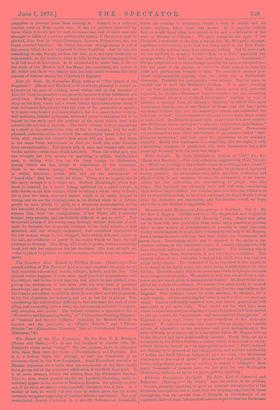The Ritual of the New Testament. By the Rev. 1'.
E. Bridgett. (Burns and Oates,)—We do not feel inclined to quarrel with Mr. Bridgett's views about " ritual." We are, anyhow, more in sympathy with them than with the views of Presbyterians and Puritans. But it is a forlorn hope, this attempt to find the foundation of an .elaborate ritual in the New Testament. Some Protestant traveller at Rheims expresses his wonder that the ceremonies of the Mass should have grown out of the primitive celebration of the Holy Eucharist. It is no more strange, retorts our author, than the Protestant Sunday. This, he says, would greatly startle an Apostolic Christian, could he suddenly appear in the streets of Boston or London. Not greatly, we may say, if he were, as almost every apostolic Christian was, a Jew. As a matter of fact, he would rub his eyes in either place, but he would certainly recognise something of familiar practice and theory. Put yea- resascitated Jewish Christian in a strictly Sabbatarian household, where no cooking is permitted, where a walk is sinful, and ho would, anyhow, know what was meant. Is it equally certain that he would know what was meant if he saw a celebration of the mass at Rheims or Cologne ? We quite recognise the right of the Christian community to develop a ritual, but Mr. Bridgett's attempt, ingenious as it certainly is, to find the thing itself in the Now Testa- ment, is really nothing more than elaborate trifling. Did he ever read, we are inclined to wonder, Swift's "Tale of a Tub," especially the passage where Peter finds out that ' gold lace' means a broomstick ?' We are surprised not to find—though possibly wo have overlooked it— due use made of the passage in which St. Paul wishes to have his cloke and parchments brought to him. We remember another pro- ritual controversialist arguing that the cloke was a Eucharistic vestment. Probably the parchments were missals. But we must be careful not to hurt Mr. Bridgett's feelings. It is quite touching to see how sensitive these are. With much grave and sorrowful reproach, ho lectures Protestant controversialists for not observing the "ordinary decency of civilised intercourse," quoting, by way of instance, a passage from Dr. Hessoy's "Sunday," in which that most decorous of writers says of the Church of Rome that she has "made the former of these [the two Sacraments] a charm, and condensed the latter into an idol." Controversialists will, and in fact must, throw stones at each other. Mr. Bridgett himself talks somewhere of a most respect- able Protestant divine having as "a colleague in invective, Lola Montez," but Dr. Hessoy's is really not a barbarously jagged stone. Protestants are accustomed to hear their celebrations of sacraments called " blas- phemous mockeries," and look upon the expression as an ordinary amenity. Really this tenderness is a surprising and, we ought to add, a gratifying symptom in gentlemen who were themselves but a few years ago so handy with the rack and faggot.


































 Previous page
Previous page